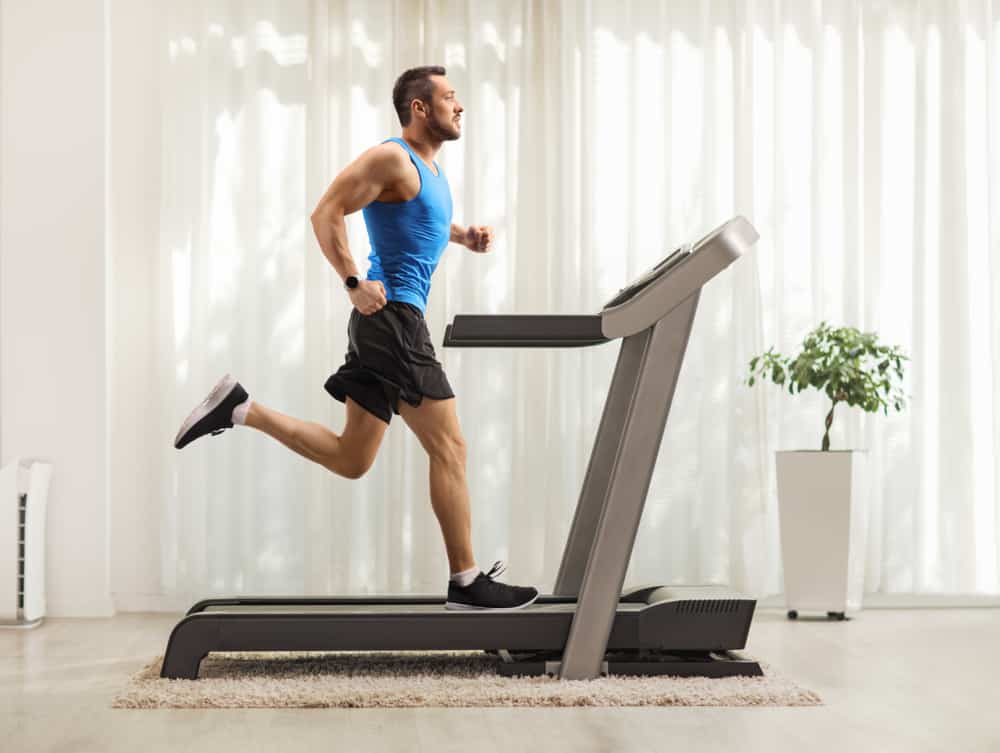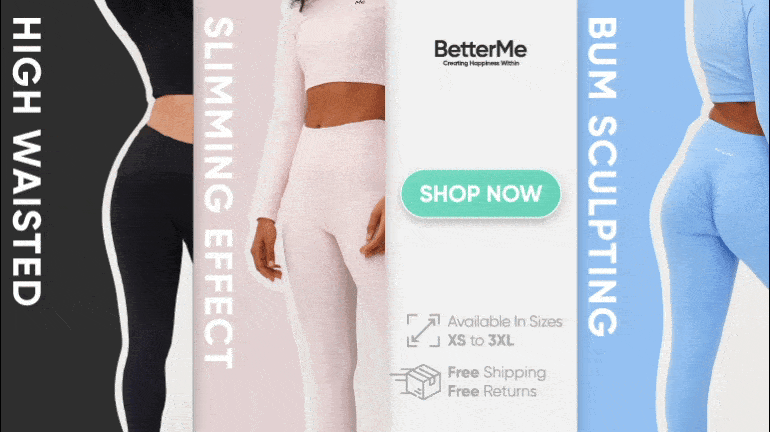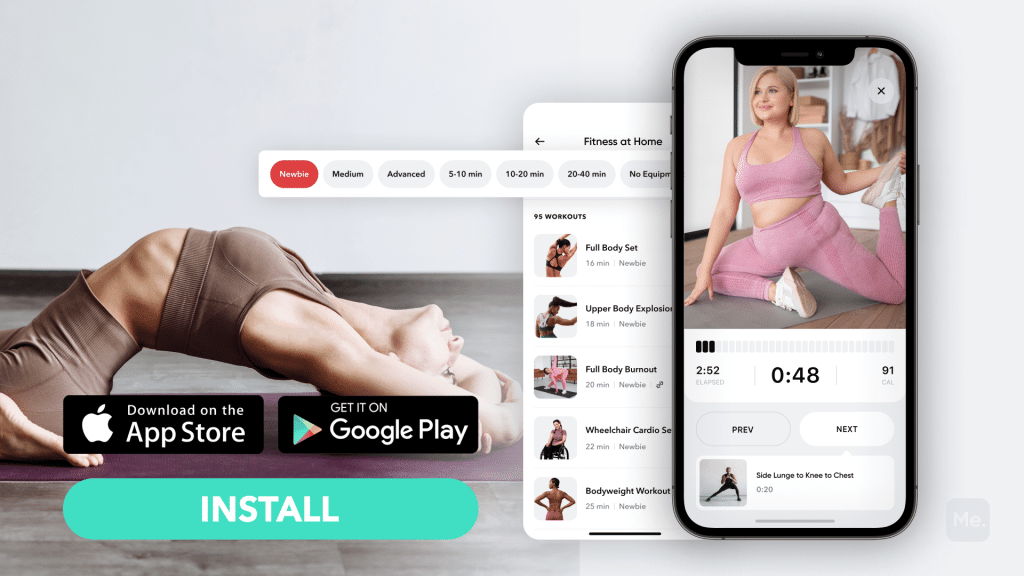Losing Inches Not Weight
Have you been working out and eating right with the goal of shedding some extra pounds but when you weigh yourself the scale does not seem to go down? To make matters worse, maybe you have also realized that some clothes that were extremely tight before now fit better or they are even quite loose on you? This means that you are losing inches not weight through your diet and exercise.
Understandably, this can be quite frustrating. We live in a world where we are conditioned to believe that the number on the scale matters. However, this is not true. The goal of seeing the number on the scale go down might not be the greatest perspective that you can look at during your weight loss journey.
Why Am I Losing Inches Not Weight?
Here are some of the reasons why you are losing inches not weight:
-
You Are Gaining Muscle
This is the most common reason behind your clothes fitting better while the scale remains the same (or shows a much lower number than expected). One upside of working out whether through running, Zumba classes, yoga, Pilates or weight lifting is that we build muscle. However, the muscles do not wait until all the fat is gone for them to grow.
Instead, these muscles grow under the extra layer of fat and as the fat goes away, so will you notice more and more muscle definition. Also, remember that while a pound of fat weighs the same as a pound of muscle, muscle is dense, thus takes up much less space than fat does (8). This is why you will notice that you are losing inches and not fat.
Lean and toned up body isn’t just a far-fetched fantasy. Check out the BetterMe app and watch it propel your weight loss journey into high gear!
-
Increased Bone Density
Exercise is known to increase bone density and improve overall bone health. Bones, like muscles, are living tissue that respond to regular workouts by becoming stronger. The bigger and stronger your bones get, the better protection you get against osteoporosis.
Exercises such as walking, hiking, jumping, jogging, climbing stairs, playing tennis, dancing and weight lifting (especially squats), are some of the best examples of workouts that contribute to maximum bone density (9). While this is fantastic, the more mass your bones get, the more they affect your weight. Thus, this could also be why you are losing inches not weight after putting in work at the gym.
-
Hormones
This is a factor that mostly affects women, especially during menstruation. Hormone levels fluctuate throughout the 28-day menstrual cycle, but they tend to be more imbalanced around the period. Due to this, you can find that your body retains more water and salt during this time (14).
This can make you feel like you have gained weight and even change the number on your scale even if your clothes still fit the same. You should not let this factor worry you as this hormonal water retention will clear up as soon as your period is over.
Read More: What To Do When You Can’t Lose Weight: How To Stop The Scale From Creeping Up
-
Water Retention
This does not always happen during the period week and is not just a source of concern in women. Men too, can retain fluid in their bodies. Water or fluid retention is also called edema. It is caused by factors such as physical inactivity, menstruation, foods high in sodium and carbs, medication such as anti-inflammatories and some oral contraceptives as well as kidney and heart disease. Typical variations in water levels can cause a person’s weight to fluctuate by a few pounds, even within a single day.
Unless you have a chronic illness, water retention is quite easy to fix. Reducing salt in food, drinking more water, reducing carbohydrates in your diet, exercising, or taking supplements such as Vitamin B-6 and magnesium oxide are just some ways that you can lose the water weight (13). Soon your weight loss will match the lost inches.
-
Your Bathroom Scale Might Be Lying To You
When most of us start improving our diets and working out, we wake up excited each morning to step on our bathroom scales to check how many pounds we lost. If you notice that your weight fluctuates a lot or does not change while your inches keep disappearing, it might be because your scale is faulty.
While digital bathroom scales are considered to be more reliable than mechanical scales, there are still many factors that can make them give false results (5). After all, some people have reported having gained seven pounds within the day or even ten pounds in just a matter of minutes from one weigh-in to another.
-
A Weight-Loss Plateau
This is the point whereby you no longer lose weight despite dietary changes and exercise. At the beginning of your weight loss journey, you might lose weight at a rapid pace; however as you continue, your metabolism declines causing you to burn fewer calories than you did at your heavier weight (11).
Your slower metabolism will slow your weight loss, even if you eat the same number of calories that helped you lose weight. In spite of the plateau, you may continue to lose inches as your muscle mass increases, even though your weight will stay the same (6).
Losing Inches Not Weight: What Should I Do?
Weighing yourself every morning (or few weeks) and noticing that the number on the weight scale has not gone down, or worse has gone up can really put a damper on your mood. Worse, it can make you quit going to the gym, working out and eating healthy, prompting you to fall into old and unhealthy habits.
To prevent this dangerous slope, here are some things that you can focus on instead of the fact that your weight is not going down:
Stop Weighing Yourself
Remember that joke where people remove their socks before stepping on a weighing scale? The joke has some truth in it because the number on the scale tends to reflect everything; meaning the number reflects the weight of muscles, fat, bones, organs, food, and water in your body (1).
Trust Your Measuring Tape
Before you start working out, take out your measuring tape and note down the measurements of different parts of your body. For example, your chest, upper and lower waist, thighs, arms, and hips. After a couple of weeks, instead of stepping on the weighing scale, take the tape again and measure yourself. The difference in these numbers will let you know if your hard work is paying off or not.
Once you have done this here are some things that you should focus on instead of the fact that you are losing inches not weight:
Note How You Look In Pictures
Before you start working out – either at home or the gym – take pictures of your front, back and sides. After about a month of dedicated exercise and healthier food choices take the same pictures again and compare the newer images to those you took before. The difference reflected in these images is a much healthier way of tracking your weight and fat loss as compared to any number that might pop up on the scale.
Health Over Size
Remember that your health is more important than any number on the scale and that we are not all built the same. Your friend might weigh less than you, but they might have more fat in their bodies as compared to you. Other than weight loss, some other ways in which exercise improves health include (2):
- Reduces feelings of anxiety for a short while
- Improves thinking, learning, and judgment skills
- Can reduce the risk of depression and anxiety.
- Lowers the risk of heart disease and stroke
- Helps you sleep better
- Reduces your risk of developing type 2 diabetes and metabolic syndrome
- Reduces the risk of some types of cancer including, breast, oesophagus, colon, kidney, endometrial, lung, bladder and stomach cancer.
- Increases your chances of living longer as it reduces your chances of getting most illnesses
Read More: Yogic Diet: Keep Your Body Nourished And Your Mind Clear
Take Note Of How Your Clothes Fit
You do not need to buy clothes in a smaller size to measure if you are losing weight. After a few weeks of a healthy diet, conscious portion control and working out, your old clothes that fit you at a bigger size will start feeling quite loose on you.
While your weight might not change (due to the growing muscles and increased bone mass), your clothes will start to fit better, and eventually, they might start hanging off you prompting you to have them taken in or send you on a whole wardrobe shopping trip.
Set Gym Performance Goals
Recognizing that you are getting stronger can be motivating. When you start exercising, you will most probably get winded and need several breaks during a ten-minute high-intensity interval workout. Instead of obsessing about what the scale says, set a goal that by the end of two weeks, you will be taking lesser breaks and breathing better during your workout. Some other goals that you can set for yourself can include:
- Doing a pull-up or push up in a month.
- Lifting heavier weights
Such simple things are more positive for your mental health than whatever numbers appear on your bathroom scale.
BetterMe app will kick you out of the mental funk, shake off your extra weight, rid you off you energy-zapping habits, and help you sculpt the body of your dreams. Intrigued? Hurry up and change your life for the better!
If You Insist On Weighing Yourself, Buy A Scale That Measures Your Body Fat
As we have discussed above, normal scales measure everything without really telling you what is happening inside your body. Scales that use bioelectrical impedance are better as they measure your body and muscle fat. These measurements are more important than your overall weight.
Get A Physical Done
The great thing about your yearly physical is that it measures things such as your cholesterol, blood pressure, blood sugar and inflammatory markers. While your weight might not change from exercising and eating healthier, these factors will show an improvement once you get your results back from your doctor. This proves that while the scale does not show what you wish it to show, your efforts are working.
Consider How You Feel
Are you sleeping better? Have you stopped constantly craving sugar and junk food? Do you have more energy during the day? If the answer to all these questions is yes, then you are doing great, and the number on the scale is not as important as all these factors.
Is Losing Weight But Not Inches Possible?
Yes, it is. Most of us expect that with lost weight come lost inches, meaning that those jeans will no longer be digging into your waist. But what does it mean when the numbers on the scale go down, but the jeans still do not fit right? What could be the cause of this?
Here are some factors (16):
-
Type Of Exercise And Form
While most of us know what types of exercises to do to reduce our arms, thighs or abs, not many of us know or pay mind to the proper form needed to do these workouts in the right way. For ab and core exercises, you need to engage the transverse abdominis and the rectus abdominis for great results.
However, without proper form, you will most probably engage your rectus abdominis (six-pack abs) and disregard the inner transverse abdominis. While the outer muscle strengthens, the inner one is left as weak as it was before you began working out and thus, the inches along your waist will not reduce.
In regards to exercise type, workouts such as lateral bends, weighted crunches, cable wood chops and ab wheel rollouts (12) can increase the inches around your waist since they work out the external and internal obliques.
-
Fat Distribution Within Your Body
Many people start dieting and exercising with the aim of shrinking some parts of their body, such as the arms, stomach, thighs, hips, and love handles. This means that while working out, many people will mostly end up measuring these areas and using them as a determinant of their progress.
However, we tend to forget that these parts have a lot of fat, and it cannot disappear quickly. Also spot exercising is a myth. Working out one body part, excessively will not make it shrink faster and will only lead to fatigue and injury.
Instead of measuring the biggest areas of your body, try paying mind to the smaller areas that do not carry a lot of extra fat. We lose fat relatively evenly throughout our bodies, meaning that the smaller parts will show results faster than the bigger areas (15). Those rings that you could not wear before will start slipping on easily before those pants ever make it past your thighs.
-
Types Of Food In Your Diet
When you change your diet, some of the things that come from this change can cause bloating and gas which affect the size of your waistline. Here are some healthy foods that may lead to gassiness and bloating (3):
- Dairy products especially if you are lactose intolerant.
- Vegetables and fruits such as cabbages, Brussels sprouts, apricots, carrots, cauliflower and prunes
- Whole grains and oats – While these foods are celebrated for their high fibre content, abruptly increasing the amount of fiber you eat can cause gas, bloating, and constipation especially if you do not drink a lot of water.
- Beans and lentils – They contain a sugar known as oligosaccharide, which the human body cannot fully breakdown. The oligosaccharides can only be broken down in the large intestines where the process causes fermentation and the production of gas that we release as flatulence (17).
You don’t necessarily need to exclude these healthy foods to avoid bloating. Making adjustments such as gradually increasing your fiber intake, drinking plenty of water, rinsing and pressure-cooking your dry beans, or choosing lactose-free dairy products can allow you to include these healthy foods while minimizing gas and bloating.
-
Cutting Calories Without Working Out
We all know that cutting calories is among one of the best ways to lose weight. It is advisable to cut 500 to 1000 calories a day from your typical diet for sustainably-paced weight loss (7). However, cutting calories or being on a caloric deficit without workouts of any kind – cardio or weightlifting – may lead to muscle loss instead of fat loss.
Remember that while a pound of fat weighs the same as a pound of muscle, the latter occupies less space within the body as compared to the former. This means that while your weight might go down, your inches might not change at all.
The Bottom Line
Focusing on why you are losing inches but not weight is truly not one of the best ways to approach fitness. Many factors can hinder the scale from changing, and most of them are things that we cannot control. Instead of dwelling on your scale, choose instead, to better yourself at your workouts and keep making healthy food choices as you mind your portions.
At the end of the day, your athletic performance during workouts and what you see in the mirror does not lie. Being able to lift heavier weights, run a longer distance as well as a slimmer face, flatter stomach and smaller arms and thighs tell you that your dedication to working out is working.
If you are considering changing your diet or starting to exercise, remember first to talk to your doctor so they may advise you on the way forward. This is especially important for anyone with a chronic illness, anyone who has had an eating disorder or has a problem with their bones.
FAQs
Why Am I Losing Inches But Not Weight?
If you are combining working out and eating right, then the most obvious answer to this is that you are gaining muscle in place of the lost fat. A pound of muscle weighs the same as a pound of fat; however, the former occupies less space compared to the latter. More muscle and less fat mean that your clothes will be looser on you even if the scale has not budged.
Is Losing Inches Better Than Losing Weight?
In a way, yes it is. Factors such as genetic makeup, gender, and age all determine your body weight (10). While we all believe that the number on the scale reflects how well we are doing on our weight loss journey, not all weight loss is fat.
Losing inches means that whatever changes you have made in your life, be it on your diet or through exercise are working. Also, keep in mind that these lost inches come with many more health benefits that are much more important than a number on a scale.
Why Am I Losing Inches But Not Weight On Keto?
Before you lose your mind wondering how ‘losing inches but not weight keto diet’ is a thing, please remember the above factors that we stated on why you might be losing inches not weight. Factors mentioned like increased bone density, hormonal imbalances, water retention, gaining muscles and weight-loss plateaus still affect those on a ketogenic diet. Take a minute to talk to your doctor or nutritionist and you can zero in which of the above reasons are causing that.
Can You Lose Inches And Gain Weight?
Indeed you can. It all goes back to the fact that muscle is more dense than fat. Incorporating strength training or weight lifting into your routine could be the reason why this is happening (4).
Get your personalized
meal plan!

DISCLAIMER:
This article is intended for general informational purposes only and does not address individual circumstances. It is not a substitute for professional advice or help and should not be relied on to make decisions of any kind. A licensed physician should be consulted for diagnosis and treatment of any medical conditions. Any action you take upon the information presented in this article is strictly at your own risk and responsibility!
SOURCES:
- Are You Losing Inches But Not Losing Weight? (2020, verywellfit.com)
- Benefits of Physical Activity (2020, cdc.gov)
- Bloating 101: Why You Feel Bloated (2010, webmd.com)
- Can a Person Lose Inches & Gain Weight? (n.d, livestrong.com)
- Can I Trust My Bathroom Scale? (2018, nytimes.com)
- Can You Lose Inches & Not Pounds? (n.d, livestrong.com)
- Counting calories: Get back to weight-loss basics (2020, mayoclinic.org)
- Don’t Fall for Fitness Myths (2004, webmd.com)
- Exercise for Your Bone Health (2018, bones.nih.gov)
- Factors That Influence Body Weight (2003, ncbi.nlm.nih.gov)
- Getting past a weight-loss plateau (2020, mayoclinic.org)
- How Do I Get a Bigger Waist? (2019, livestrong.com)
- How to lose water weight naturally (2018, medicalnewstoday.com)
- Weight gain during period: What to know (2019, medicalnewstoday.com)
- When Losing Weight, What Is Usually the First to Go? (n.d, livestrong.com)
- Why Am I Losing Weight But Not Inches? (n.d, livestrong.com)
- Why Beans Cause Gas (2020, verywellfit.com)




















